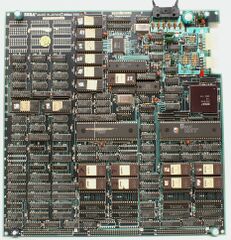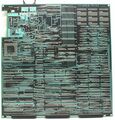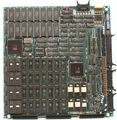Difference between revisions of "Sega OutRun hardware"
From Sega Retro
| Line 11: | Line 11: | ||
'''Sega's OutRun hardware''' was released in 1986 with the driving game ''[[OutRun]]''. It is a successor to their [[Sega Hang-On Hardware|Hang-On hardware]], making it the second in [[Sega]]'s "Super Scaler" series of pseudo-3D arcade hardware. It was succeeded by the [[Sega X Board]] in 1987. | '''Sega's OutRun hardware''' was released in 1986 with the driving game ''[[OutRun]]''. It is a successor to their [[Sega Hang-On Hardware|Hang-On hardware]], making it the second in [[Sega]]'s "Super Scaler" series of pseudo-3D arcade hardware. It was succeeded by the [[Sega X Board]] in 1987. | ||
| − | + | Three games made use of the hardware, all of which are driving games. However, only ''[[OutRun]]'' and ''[[Turbo OutRun]]'' are truly for this hardware, as ''[[Super Hang-On]]'' was also released for the Hang-On hardware in a mostly identical form. | |
| − | + | ==Hardware== | |
| + | The OutRun hardware, like the Hang-On hardware, has specifications similar to those of the [[System 16]], with the addition of a second [[68000]] processor and a separate video board which allowed for an extra graphics layer for the road as well as [[sprite]]/texture scaling capabilities. | ||
| − | ==Technical Specifications== | + | The OutRun hardware can do everything the Hang-On hardware can do, but its processors are clocked higher (allowing for quicker calculations) and the video board's capabilities have been expanded, capable of drawing two roads (the Hang-On hardware can only draw one) and rendering sprites/textures using a framebuffer system with a higher fillrate (the Hang-On hardware used a line-buffer system). At the time, the OutRun hardware was a very powerful but expensive arcade board, with arcade operators advised to charge twice as many credits than for regular arcade machines. |
| + | |||
| + | ===Technical Specifications=== | ||
* Board composition: CPU Board, Video Board{{ref|https://github.com/mamedev/mame/blob/master/src/mame/drivers/segaorun.c}} | * Board composition: CPU Board, Video Board{{ref|https://github.com/mamedev/mame/blob/master/src/mame/drivers/segaorun.c}} | ||
* Main [[wikipedia:Central processing unit|CPU]]: 2× [[Motorola 68000]] @ 12.5 MHz (16-bit & 32-bit instructions @ 4.375 MIPS) | * Main [[wikipedia:Central processing unit|CPU]]: 2× [[Motorola 68000]] @ 12.5 MHz (16-bit & 32-bit instructions @ 4.375 MIPS) | ||
Revision as of 03:37, 16 October 2015

| |||||
| Sega OutRun hardware | |||||
|---|---|---|---|---|---|
| Manufacturer: Sega | |||||
|
Sega's OutRun hardware was released in 1986 with the driving game OutRun. It is a successor to their Hang-On hardware, making it the second in Sega's "Super Scaler" series of pseudo-3D arcade hardware. It was succeeded by the Sega X Board in 1987.
Three games made use of the hardware, all of which are driving games. However, only OutRun and Turbo OutRun are truly for this hardware, as Super Hang-On was also released for the Hang-On hardware in a mostly identical form.
Hardware
The OutRun hardware, like the Hang-On hardware, has specifications similar to those of the System 16, with the addition of a second 68000 processor and a separate video board which allowed for an extra graphics layer for the road as well as sprite/texture scaling capabilities.
The OutRun hardware can do everything the Hang-On hardware can do, but its processors are clocked higher (allowing for quicker calculations) and the video board's capabilities have been expanded, capable of drawing two roads (the Hang-On hardware can only draw one) and rendering sprites/textures using a framebuffer system with a higher fillrate (the Hang-On hardware used a line-buffer system). At the time, the OutRun hardware was a very powerful but expensive arcade board, with arcade operators advised to charge twice as many credits than for regular arcade machines.
Technical Specifications
- Board composition: CPU Board, Video Board[1]
- Main CPU: 2× Motorola 68000 @ 12.5 MHz (16-bit & 32-bit instructions @ 4.375 MIPS)
- Sound CPU: Zilog Z80 @ 4 MHz (8-bit & 16-bit instructions @ 0.58 MIPS)
- Sound chips:
- FM synthesis chip: Yamaha YM2151 @ 4 MHz (8 FM channels)
- PCM sampling chip: SegaPCM (315-5218) @ 4 MHz (stereo output, 16 PCM channels, 12-bit audio, 31.25 kHz sampling rate)
- GPU: Sega Super Scaler chipset
- Graphics board: Sega 837-6064 / 171-5377 VIDEO Board @ 25.1748 MHz (315-5197 Sega Custom Tilemap Generator, 315-5211 Sega Custom Sprite Generator, 315-5242 Sega Custom Color Encoder)
- Road graphics chips: 315-5155 Sega Road Bit Extraction, 315-5222 Signetics PLS153N Road Mixing
- Memory: 3534.25 KB to 3758.25 KB
- RAM: 750.25 KB, including 670 KB high-speed SRAM (Static RAM)[1]
- Main RAM: 64 KB (32 KB work, 32 KB shared)
- Video RAM: 684 KB
- CPU Board: 84 KB (4 KB sprites, 8 KB colors, 64 KB tiles, 4 KB text, 4 KB roads)
- Video Board: 600 KB SRAM
- Sound RAM: 2.25 KB
- SRAM speed: 0-45 nanoseconds[2]
- ROM: 2784-3008 KB (including 544-640 KB EPROM and 1024 KB Mask ROM)
- Video memory: 2572 KB (684 KB video RAM, 1888 KB video ROM)
- RAM: 750.25 KB, including 670 KB high-speed SRAM (Static RAM)[1]
- Video resolution: 320×224 (display), 400×262 (overscan), progressive scan
- Scanlines: 224 (display), 262 (overscan)
- Refresh rate: 60.0543 Hz (V-sync)
- Frame rate: 30 frames per second
- Color palette: 98,304
- 16-bit color palette: 15-bit RGB high color depth (32,768 colors) and 1-bit shadow & highlight that triples up to 98,304 colors.
- Colors on screen: 12,288
- Graphical planes:
- 2 tilemap layers: System 16B tilemap system, row & column scrolling, parallax scrolling
- 1 text layer
- 1 sprite layer: Hardware sprite-scaling/zooming
- 1 road layer: Can draw 2 roads at once, 512×256 pixels each, tiled bitmaps
- Translucent shadows
- Sprite/texture capabilities: Frame-buffered sprites/textures with zooming capabilities, 128 on-screen sprites per frame, 7680 sprites/textures scaled per second, 16 colors per sprite/texture
- Video clock cycles: 25.1748 MHz (60.0543 Hz refresh rate)
- Sprite pixel/texel fillrate: 25.1748 million pixels/texels per second, 419,199 pixels/texels per frame/refresh, 1600 sprite pixels/texels per scanline, 128 sprites/textures per scanline
Gallery
List of Games
- Out Run (1986)
- Super Hang-On (1987)
- Turbo OutRun (1989)
- Limited Edition Hang-On (1991)
| Sega arcade boards |
|---|
| Originating in arcades |
|
77
78
79
80
81
82
83
84
85
86
87
88
89
90
91
92
93
94
95
96
97
98
99
|
| Console-based hardware |
|
84
85
86
87
88
89
90
91
92
93
94
95
96
97
98
99
00
01
02
03
04
05
06
07
08
09
10
11
12
13
14
|
| PC-based hardware |
|
05
06
07
08
09
10
11
12
13
14
15
16
17
18
19
20
21
22
23
|



